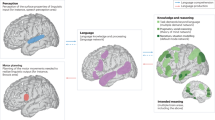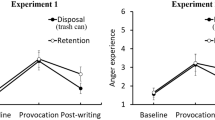Abstract
Bayesian principles show up across many domains of human cognition, but wishful thinking—where beliefs are updated in the direction of desired outcomes rather than what the evidence implies—seems to threaten the universality of Bayesian approaches to the mind. In this Article, we show that Bayesian optimality and wishful thinking are, despite first appearances, compatible. The setting of opposing goals can cause two groups of people with identical prior beliefs to reach opposite conclusions about the same evidence through fully Bayesian calculations. We show that this is possible because, when people set goals, they receive privileged information in the form of affective experiences, and this information systematically supports goal-consistent conclusions. We ground this idea in a formal, Bayesian model in which affective prediction errors drive wishful thinking. We obtain empirical support for our model across five studies.
This is a preview of subscription content, access via your institution
Access options
Access Nature and 54 other Nature Portfolio journals
Get Nature+, our best-value online-access subscription
$29.99 / 30 days
cancel any time
Subscribe to this journal
Receive 12 digital issues and online access to articles
$119.00 per year
only $9.92 per issue
Buy this article
- Purchase on Springer Link
- Instant access to full article PDF
Prices may be subject to local taxes which are calculated during checkout



Similar content being viewed by others
Data availability
The data that support the findings of this study are available at https://osf.io/59dmr/?view_only=b8ea1a66b5e84d1e8d67391662b60d82.
Code availability
The custom code that supports the findings of this study is available at https://osf.io/59dmr/?view_only=b8ea1a66b5e84d1e8d67391662b60d82.
Change history
02 April 2024
A Correction to this paper has been published: https://doi.org/10.1038/s41562-024-01873-0
References
Knill, D. C. & Pouget, A. The Bayesian brain: the role of uncertainty in neural coding and computation. Trends Neurosci. 27, 712–719 (2004).
Doya, K., Ishii, S., Pouget, A. & Rao, R. P. Bayesian Brain: Probabilistic Approaches to Neural Coding (MIT, 2007).
Hohwy, J. The Predictive Mind (Oxford Univ. Press, 2013).
Clark, A. Whatever next? Predictive brains, situated agents, and the future of cognitive science. Behav. Brain Sci. 36, 181–204 (2013).
Lee, T. S. & Mumford, D. Hierarchical Bayesian inference in the visual cortex. J. Opt. Soc. Am. A Opt. Image Sci. Vis. 20, 1434–1448 (2003).
Oaksford, M. & Chater, N. Bayesian Rationality: The Probabilistic Approach to Human Reasoning (Oxford Univ. Press, 2007).
Friston, K. The free-energy principle: a unified brain theory? Nat. Rev. Neurosci. 11, 127–138 (2010).
Tenenbaum, J. B., Kemp, C., Griffiths, T. L. & Goodman, N. D. How to grow a mind: statistics, structure, and abstraction. Science 331, 1279–1285 (2011).
Barrett, L. F. The theory of constructed emotion: an active inference account of interoception and categorization. Soc. Cogn. Affect. Neurosci. 12, 1–23 (2017).
Williams, D. Hierarchical Bayesian models of delusion. Conscious. Cogn. 61, 129–147 (2018).
Tappin, B. M. & Gadsby, S. Biased belief in the Bayesian brain: a deeper look at the evidence. Conscious. Cogn. 68, 107–114 (2019).
Mandelbaum, E. Troubles with Bayesianism: an introduction to the psychological immune system. Mind Lang. 34, 141–157 (2019).
Lord, C. G., Ross, L. & Lepper, M. R. Biased assimilation and attitude polarization: the effects of prior theories on subsequently considered evidence. J. Pers. Soc. Psychol. 37, 2098–2109 (1979).
Madson, G. J. & Hillygus, D. S. All the best polls agree with me: bias in evaluations of political polling. Political Behav. 42, 1055–1072 (2020).
Kunda, Z. The case for motivated reasoning. Psychol. Bull. 108, 480–498 (1990).
Druckman, J. N. & McGrath, M. C. The evidence for motivated reasoning in climate change preference formation. Nat. Clim. Change 9, 111–119 (2019).
Kahan, D. M. in Emerging Trends in the Social and Behavioral Sciences (eds Scott, R. A. et al.) 1–15 (John Wiley & Sons, 2015).
Gershman, S. J. How to never be wrong. Psychon. Bull. Rev. 26, 13–28 (2019).
Jern, A., Chang, K.-M. K. & Kemp, C. Belief polarization is not always irrational. Psychol. Rev. 121, 206–224 (2014).
Cook, J. & Lewandowsky, S. Rational irrationality: modeling climate change belief polarization using Bayesian networks. Top. Cogn. Sci. 8, 160–179 (2016).
Neuman, R., Rafferty, A. & Griffiths, T. A bounded rationality account of wishful thinking. In Proc. Annual Meeting of the Cognitive Science Society Vol. 36 (Cognitive Science Society, 2014).
Dorst, K. Rational polarization. Philos. Rev. 132, 355–458 (2023).
Melnikoff, D. E. & Strohminger, N. The automatic influence of advocacy on lawyers and novices. Nat. Hum. Behav. 4, 1258–1264 (2020).
Batson, C. D. Rational processing or rationalization? The effect of disconfirming information on a stated religious belief. J. Pers. Soc. Psychol. 32, 176–184 (1975).
Caplin, A. & Leahy, J. V. Wishful Thinking Working Paper No. w25707 (National Bureau of Economic Research, 2019).
Loewenstein, G. & Lerner, J. S. in Handbook of Affective Sciences (eds Davidson, R. J. et al.) 619–642 (Oxford Univ. Press, 2003).
Schwarz, N. & Clore, G. L. Mood as information: 20 years later. Psychol. Inq. 14, 296–303 (2003).
Clore, G. L. & Huntsinger, J. R. How emotions inform judgment and regulate thought. Trends Cogn. Sci. 11, 393–399 (2007).
Heffner, J., Son, J.-Y. & FeldmanHall, O. Emotion prediction errors guide socially adaptive behaviour. Nat. Hum. Behav. 5, 1391–1401 (2021).
Barrett, L. F. & Simmons, W. K. Interoceptive predictions in the brain. Nat. Rev. Neurosci. 16, 419–429 (2015).
Seth, A. K. & Friston, K. J. Active interoceptive inference and the emotional brain. Phil. Trans. R. Soc. Lond. B 371, 20160007 (2016).
Atzil, S., Gao, W., Fradkin, I. & Barrett, L. F. Growing a social brain. Nat. Hum. Behav. 2, 624–636 (2018).
Hoemann, K., Xu, F. & Barrett, L. F. Emotion words, emotion concepts, and emotional development in children: a constructionist hypothesis. Dev. Psychol. 55, 1830–1849 (2019).
Mathys, C. D. et al. Uncertainty in perception and the hierarchical Gaussian filter. Front. Hum. Neurosci. 8, 825 (2014).
Gershman, S. J. A unifying probabilistic view of associative learning. PLoS Comput. Biol. 11, e1004567 (2015).
Festinger, L. & Carlsmith, J. M. Cognitive consequences of forced compliance. J. Abnorm. Psychol. 58, 203–210 (1959).
Bem, D. J. Self-perception: an alternative interpretation of cognitive dissonance phenomena. Psychol. Rev. 74, 183–200 (1967).
Robinson, M. J. & Berridge, K. C. Instant transformation of learned repulsion into motivational ‘wanting’. Curr. Biol. 23, 282–289 (2013).
Dayan, P. & Berridge, K. C. Model-based and model-free Pavlovian reward learning: revaluation, revision, and revelation. Cogn. Affect. Behav. Neurosci. 14, 473–492 (2014).
Melnikoff, D. E. & Bailey, A. H. Preferences for moral vs. immoral traits in others are conditional. Proc. Natl Acad. Sci. USA 115, E592–E600 (2018).
Melnikoff, D. E., Lambert, R. & Bargh, J. A. Attitudes as prepared reflexes. J. Exp. Soc. Psychol. 88, 103950 (2020).
Loewenstein, G. Out of control: visceral influences on behavior. Organ. Behav. Hum. Decis. Process. 65, 272–292 (1996).
Loewenstein, G., O’Donoghue, T. & Rabin, M. Projection bias in predicting future utility. Q. J. Econ. 118, 1209–1248 (2003).
Read, D. & Van Leeuwen, B. Predicting hunger: the effects of appetite and delay on choice. Organ. Behav. Hum. Decis. Process. 76, 189–205 (1998).
Rescorla, R. A. & Wagner, A. R. in Classical Conditioning II: Current Research and Theory (eds Black, A. H. & Prokasy, W. F.) 64–99 (Appleton-Century-Crofts, 1972).
Bush, R. R. & Mosteller, F. Stochastic Models for Learning (Wiley, 1955).
Sutton, R. S. Learning to predict by the methods of temporal differences. Mach. Learn. 3, 9–44 (1988).
Festinger, L. A Theory of Cognitive Dissonance (Stanford Univ. Press, 1957).
Elliot, A. J. & Devine, P. G. On the motivational nature of cognitive dissonance: dissonance as psychological discomfort. J. Pers. Soc. Psychol. 67, 382–394 (1994).
Seth, A. K. Interoceptive inference, emotion, and the embodied self. Trends Cogn. Sci. 17, 565–573 (2013).
Smith, R. et al. A Bayesian computational model reveals a failure to adapt interoceptive precision estimates across depression, anxiety, eating, and substance use disorders. PLoS Comput. Biol. 16, e1008484 (2020).
Mercier, H. & Sperber, D. Why do humans reason? Arguments for an argumentative theory. Behav. Brain Sci. 34, 57–74 (2011).
von Hippel, W. & Trivers, R. The evolution and psychology of self-deception. Behav. Brain Sci. 34, 1–16 (2011).
Acknowledgements
D.E.M. was supported by the Stanford Graduate School of Business. N.S. was supported by the Wolpow Family Faculty Scholar Fund, the Wharton Dean’s Research Fund and the Wharton Behavioral Lab. The funders had no role in study design, data collection and analysis, decision to publish or preparation of the manuscript.
Author information
Authors and Affiliations
Contributions
D.E.M. and N.S. jointly designed the studies, analysed the data and wrote the paper. D.E.M. is responsible for the formal model; in an equally weighty intellectual achievement, N.S. is responsible for typesetting that model in LaTeX.
Corresponding author
Ethics declarations
Competing interests
The authors declare no competing interests.
Peer review
Peer review information
Nature Human Behaviour thanks Adam Bear, Mike Oaksford and the other, anonymous, reviewer(s) for their contribution to the peer review of this work. Peer reviewer reports are available.
Additional information
Publisher’s note Springer Nature remains neutral with regard to jurisdictional claims in published maps and institutional affiliations.
Supplementary information
Supplementary Information
Supplementary Methods, Results, Figs. 1 and 2 and References.
Rights and permissions
Springer Nature or its licensor (e.g. a society or other partner) holds exclusive rights to this article under a publishing agreement with the author(s) or other rightsholder(s); author self-archiving of the accepted manuscript version of this article is solely governed by the terms of such publishing agreement and applicable law.
About this article
Cite this article
Melnikoff, D.E., Strohminger, N. Bayesianism and wishful thinking are compatible. Nat Hum Behav 8, 692–701 (2024). https://doi.org/10.1038/s41562-024-01819-6
Received:
Accepted:
Published:
Issue Date:
DOI: https://doi.org/10.1038/s41562-024-01819-6
This article is cited by
-
Bayes versus bias in human reasoning
Nature Human Behaviour (2024)



